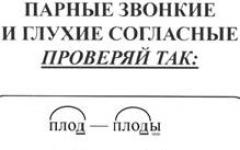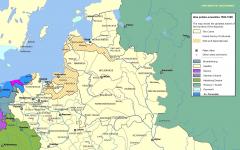Additional reasons ( Kausalsätze) always indicate the reason for what is being discussed in the main sentence. They join through alliances denn, weil And da.
Union denn does not affect the word order in subordinate clauses, while in sentences weil And da the verb must come at the very end of the sentence. Subordinate reasons are always surrounded by commas.
|
Ich schreibe dir, denn ich brauche deine Hilfe. - Iwritingyou, becauseWhatto meneededyourshelp. IchkannleidernothingindenUrlaubfahren,dennichmussarbeiten. - |
|
|
Ich schreibe dir, weil ich deine Hilfe brauche. - Iwritingyou, That's whyWhatto meneededyourshelp. WeilerstudierenmusshaterkeineZeit. – IchkannleidernothingindenUrlaubfahren,weilicharbeitenmuss. - Unfortunately, I can’t go on vacation because I have to work. |
|
|
Ich schreibe dir, da ich deine Hilfe brauche. - Iwritingyou, That's whyWhatto meneededyourshelp. DaerstudierenmusshaterkeineZeit. – Since he has to study, he doesn't have time. IchkannleidernothingindenUrlaubfahren,daicharbeitenmuss. - Unfortunately, I can’t go on vacation because I have to work. |
If the subordinate clause in a complex sentence comes before the main clause, it is recommended to use a conjunction da.
Subordinate clause with conjunction weil may stand without a main clause if it is an answer to the question:
Warumsiehstdusomudeaus? –Weilichvielgearbeitethabe.
Why do you look so tired/ so tired? - Because I worked / worked a lot.
Subordinate clauses reasons can be replaced with the following constructions:
1. Wegen +noun
VGenitiv
– SoHowweatherbad, II'm stayingHouses.
Wegen dieses schlechten Wetters bleibe ich zu Hause. - From-behindthisbadweatherII'm stayingHouses.
2. Aufgrund +noun
VGenitiv
Da das Wetter schlecht ist, bleibe ich zu Hause. – SoHowweatherbad, II'm stayingHouses.
Aufgrund dieses schlechten Wetters bleibe ich zu Hause. - From-behindthisbadweatherII'm stayingHouses.
3. Vor
Erquietschte,weilervergnuGTwar. – He squealed because he was happy.
Er quietschte vor Vergnügen. - Hesquealedfromdelight.
4. Aus + noun without article
Erheiratesie,weilersieliebte. – He married her because he loved her.
Er heiratete sie aus Liebe. - Hegot marriedonherBylove.
5. Complex sentence with conjunctive adverb
n ämlich
Ichkannnothingcommen,dennichhabekeineZeit. – I can't come because I don't have time.
Ichkannnothingcommen,ichhaben ämlichkeineZeit. – I can’t come, I, strictly speaking, don’t have time.
Creative tasks Game tasks
- Topic: Kausalangaben (weil) / Statements of reason (with the conjunction weil), Lesson: 10 %
- Topic: Kausalangaben (weil) / Statements of reason (with the conjunction weil), Lesson: 20 %
- Topic: Kausalsätze / Subordinate clauses of reason, Lesson: 10 %
- Topic: Kausalsätze / Subordinate clauses of reason, Lesson: 20 %
- Topic: Kausalsätze / Subordinate clauses of reason, Lesson: 30 %
So let's talk about German alliances! Let's take and analyze the German conjunctions that help us express the reason. German unions reasons weil, da, denn (all are translated like this: because/since/since).
What is their difference?
Grammatical difference between weil and da
Difference between weil And da grammatically none. Weil can be very easily replaced by a conjunction yes, especially when we start a sentence with this conjunction, i.e. We put the subordinate clause at the beginning.
Subordinate clause with weil and da under construction the same, let's see this with examples>
- Eva ist abends total kaputt, weil (=da) sie im Büro viel telefonieren musste . (Eva is very tired in the evenings because/since she had to make a lot of calls in the office)
- Ich gehe in die Sprachschule, weil (=da) ich Deutsch lerne. ( I go to language school because I study German.)
As you can see, after the unions weil or yes the verb goes to the end of the sentence.
You can also swap parts of a sentence by putting the subordinate clause at the beginning>>
- Weil (=Da) Eva im Büro viel telefonieren musste, ist sie abends total kaputt. (Because/since Eva had to make a lot of calls in the office, she is very tired in the evenings)
- Weil (=Da) ich Deutsch lerne, gehe ich in die Sprachschule. (Because/since I study German, I go to a language school.)
 And a couple more examples with the conjunction weil:
And a couple more examples with the conjunction weil:
- Lily möchte Fotomodell werden, weil sie dann viel Geld verdient. (Lily would like to become a fashion model because then she can earn a lot of money.)
- Weil/Da Lily viel Geld verdienen will, möchte sie Fotomodell werden. (Since Lily wants to earn a lot of money, she would like to become a fashion model.)
- Weil Rosaline Kopfschmerzen hat, nimmt sie eine Tablette. — Because Rosalina has a headache, she takes a pill.
- Rosaline nimmt eine Tablette, weil sie Kopfschmerzen hat . — Rosalina takes a pill because she has a headache.
- Herr Henning konnte nicht arbeiten, weil er Fieber hatte. — Mr Henning could not work because he had a fever.
P.S.. Weil most often used orally colloquial speech , and here is the union da preferred in writing.
The semantic difference between weil and da
 Well, in terms of meaning, there is a slight difference and I will tell you about it. German Confederation Da
draws attention to the fact that your interlocutor already knows the reason. But using union
weil, T You point out a reason that your interlocutor did not yet know about. And therefore, we cannot answer the question "why" with the help of a conjunction da!
Well, in terms of meaning, there is a slight difference and I will tell you about it. German Confederation Da
draws attention to the fact that your interlocutor already knows the reason. But using union
weil, T You point out a reason that your interlocutor did not yet know about. And therefore, we cannot answer the question "why" with the help of a conjunction da!
- Warum möchte Lily Fotomodell werden? — Weil(da)sie dann schöne Kleider Tragen Kann. (Why would Lily want to become a fashion model? - Because then she could wear beautiful dresses.)
- Warum gehst du nicht zum Basketball? – Weil(da) ich keine Zeit habe. (Why don't you go to basketball? Because I don't have time.)
- Warum konnte Herr Henning nicht arbeiten? — Weil(da)er Fieber hatte. (Why couldn't Mr. Henning work? Because he had a fever.)
!!! It’s also important not to confuse conjunction da (since/since) with identical spelling with the word da (here/here), which is a minor member of the sentence:
- Ich bin da! - I'm here!
Conjunctions denn and weil
Now let's deal with the union denn (=since)! Union weil can also be replaced by a conjunction denn, but only on condition that the subordinate clause comes after the main one (in short, it is used in the second part of the sentence).
 And here with the word denn the word order is completely different from weil and da! In this case with denn the verb does not come to the end. On the contrary, the word order remains straight, i.e. after denn first the subject, then the verb and the rest of the sentence.
And here with the word denn the word order is completely different from weil and da! In this case with denn the verb does not come to the end. On the contrary, the word order remains straight, i.e. after denn first the subject, then the verb and the rest of the sentence.
Let's look at examples:
- Ich gehe nicht zum Basketball, denn ich habe keine Zeit. – I won’t go to basketball because I don’t have time.
- Wir gehen heute spazieren, denn es ist sonnig.— We’re going for a walk today, because it’s sunny outside.
- Ich gehe heute nicht zur Arbeit, denn ich bin krank. — I’m not going to work today because I’m sick.
- Hanna ist glücklich, denn sie hat Urlaub. Hannah is happy because she has a vacation.
- Marcus hat keine Zeit, denn er muss arbeiten. — Marcus doesn’t have time because he has to work.
- Du musst die Rechnung nicht bezahlen, denn der Kaufvertrag ist ungültig. — You do not have to pay the bill, since the purchase/sale agreement is invalid.
After alliances aber - but, und - and, and, sondern - but, but, denn - because, oder - either, either subordinate clauses use direct word order.
Die Eltern fahren nach Italien für die Kinder
The parents are leaving for Italy, and the aunt will look after the children
Reverse word order
In subordinate clauses after conjunctions darum, deshalb, deswegen, sonst, trotzdem, dann, folglich used reverse word order.
That is, the subject and predicate in the subordinate clause change places.
Präsens (Present)
Ich habe keines Auto. mit dem Bus zur Arbeit
Ich habe keines Auto, mit dem Bus zur Arbeit
I don't have a car, so I take the bus to work
Perfect (Past tense) In this case auxiliary (haben/sein) to stand on first place after the union, and verb in third form leaves In the end
subordinate clause.
Ich hatte keines Auto. mit dem Bus zur Arbeit
Ich hatte keines Auto, mit dem Bus zur Arbeit
I didn't have a car, so I took the bus to work
Inversion In subordinate clauses after conjunctions, dass (what), weil (because), wenn (if, when), falls (in case), während (bye), bevor (before; before), nachdem (after that) obwohl (though) - used inversion . That is verb in a subordinate clause .
goes to the end
Präsens(Present tense)
keines Auto. Ich fahre mit dem Bus zur Arbeit
I do not have a car. I go to work by bus
Ich fahre mit dem Bus zur Arbeit, keines Auto
I go to work by bus because I don't have a car.
Ich Weiß, in der Schule
I know he is in school
Präteritum (Past tense)
keines Auto. Ich fuhr mit dem Bus zur Arbeit
I didn't have a car. I went to work by bus
Ich fuhr mit dem Bus zur Arbeit, keines Auto
I don't have a car, so I take the bus to work
Perfect (Past tense) I went to work by bus because I didn't have a car. both verbs subordinate clause go to the end , but on last place put auxiliary
or anyone else who was with the subject.
Ich habe ein Auto nicht gekauft. mit dem Bus zur Arbeit
I didn't buy a car. I went to work by bus
Ich habe ein Auto nicht gekauft, mit dem Bus zur Arbeit
I didn't buy a car because I took the bus to work If the subordinate clause is with a conjunction wenn so stands before the main clause, then the main thing often begins with the words or :
Dann
mein bald, ins Kino
If my friend comes soon, we'll go to the cinema
WENN or ALS Wenn If the subordinate clause is with a conjunction in the meaning of “when” is used if the actions in the main and subordinate clauses occur simultaneously. Also in the meaning "when", used to emphasize
recurrence
actions:
nach Moskau, mich unbedingt When he comes to Moscow, he always visits me Als also translated “when”, but used in the past tense when
one-time
action:
meine Freundin, am Sonnstag im Theater
Union um...zu + Inf. and damit expresses target .
Er geht nach Deutschland, Deutsch
He goes to Germany to learn German
Ich schenke ihm ein Lehrbuch der deutschen Sprache, er deutsche Sprache
I give him a German textbook so he can learn German
Design (AN)STATT...ZU
Anstatt seine Hausaufgaben zu machen, sieht das Mädchen fern
Instead of doing her homework, the girl watches TV
Design OHNE...ZU
Sie geht, ohne sich zu verabschieden
She leaves without saying goodbye
Inversion with DER(DIE, DAS, DESSEN)
Union der (die, das, dessen, den, dem ) expresses the definition.
Ich fahre in der Stadt, in meine Verwandten
I'm going to the city where my relatives live
A set of exercises on the topic:
Subordinate clauses in German:
Exercise 1. Insert appropriate subordinating conjunctions, choosing between “weil” and “damit”.
- Barbara entschied, auch an Wochenenden zu arbeiten, __________ sie endlich genug Geld für ihre Reisen hat.
- Barbara entschied, auch an Wochenenden zu arbeiten, ________ sie eine Reise nach Australien für den Sommer gebucht hat.
- Sein Bruder kann leider nicht mitfahren, __________ er heute alle seine Artikel vorbereiten muss.
- Gerbert muss ein neues Fahrrad bis Sommer kaufen, _________ er mit seinen Freunden an den weiten See fahren kann.
- Gerbert muss ein neues Fahrrad bis Sommer kaufen, _________ er mit seinen Freunden zusammen am weiten See angeln möchte.
- Monikas Eltern haben ihr ein kleines Auto geschenkt, _________ sie aus Gesundheitsgründen mit der U-Bahn überhaupt nicht fahren kann.
- Monikas Eltern haben ihr ein kleines Auto geschenkt, _________ sie jederzeit problemlos zur Uni fahren kann.
- Gerhild liest immer viele Fachzeitschriften, _________ ihre Kenntnisse mit der Zeit tiefer und grundsätzlicher werden.
- Gerhild liest immer viele Fachzeitschriften, ___________ sie sich um ihre Fachkenntnisse kümmert.
- Zunächst erlernte Erich den Beruf des Schaufensterdekorateurs, ____________ er die Schaufenster in den Kaufhäusern seiner Verwandten professionell dekorieren kann.
- Erich erlernte den Beruf des Schaufensterdekorateurs, __________ er die Schaufenster in den Kaufhäusern seiner Verwandten selbst dekorieren wollte.
Answers. 1. Damit. 2. Weil. 3. Weil. 4. Damit. 5. Weil. 6 Weil. 7. Damit. 8. Damit. 9. Weil. 10. Damit. 11. Weil.
Exercise 2. Fill in the blanks with suitable subordinating conjunctions.
- ________ Barbara krank ist, muss sie unbedingt im Bett bleiben.
- ________ deine Schwester will, bringen wir sie nach Hause mit unserem Auto.
- ________ er weiß, findet diese Versammlung morgen nicht statt.
- Wir haben Teneriffa als unser Reiseziel gewählt, _______ wir auf dieser Insel noch nicht gewesen sind.
- Horst lernt Spanisch, __________ er die Verhandlungen mit seinen Partnern selbst führen kann.
- Horst lernt Spanisch, __________ er die Verhandlungen mit seinen Partnern selbst führen will.
- _________ unsere Kollegen ihr Angebot rechtzeitig unterbreiten, kann unsere Firma diese Ausschreibung gewinnen.
- _________ Bettina ihren Freund abholt, wird sie ihn zu seinem Hotel bringen.
- __________ ihre Nachbarn zu Dir kommen, darfst du die Tür nicht öffnen.
- _________ ich keinen richtigen Hunger habe, kann ich auf das heutige Abendessen verzichten.
- _________ es meinen Eltern bekannt geworden ist, wird unsere Schule in zwei Jahren in ein neues Gebäude umziehen.
- Marianne versucht alle ihre Mitschüler zu versammeln, ________ sie ihren Cousin kennen lernen.
Answers . 1. Da. 2. Wenn. 3. Soweit. 4. Weil. 5. Damit. 6. Weil. 7. Wenn. 8. Wenn. 9. Wenn. 10. Da. 11. Soweit. 12. Damit.
Exercise 3. Weil oder Damit?
Exercise 4. Insert suitable conjunctions:
- Ich muss viel arbeiten, _____________ ich genug Geld habe.
- ___________ ich krank bin, muss ich meine Arbeit erledigen.
- __________ du willst, begleite ich dich nach Hause.
- ___________ du das nicht machst, rede ich nicht mehr mit dir.
- Ich gehe nach Hause, ___________ ich müde bin.
- Ich trage eine Brille, ___________ ich gut sehen kann.
- _________ du abnehmen willst, sollst du weniger Schokolade essen.
- Mein Vater ist gesund, ____________ er viel raucht.
- ____________ der Regen aufhört, gehen wir zum Strand.
- ______________ wir Glück haben, werden wir heute Abend im besten Restaurant essen.
- Du kannst zu mir kommen, ___________ du willst.
- Ich lerne Deutsch, ___________ ich nach Deutschland fahren will.
- ____________ ich ein Kind habe, läuft mein Leben ganz anders.
- Ich gehe ins Restaurant, _____________ ich Hunger habe.
- ______________ ich zur Arbeit gehe, trinke ich einen Kaffee.
- Ich kann nicht kommen, _____________ ich keine Zeit habe.
The answers are given in no particular order:
Wenn, wenn, wenn, wenn, damit, damit, bevor, obwohl, obwohl, weil, weil, weil, weil, seitdem, sobald,wann
Exercise 5. Warum? – Weil...
Welche Frage passt zu welcher Antwort? Bildet Sätze mit weil.
- Warum ißt du keine Süßigkeiten?
- Warum trinkst du Kamillentee?
- Warum ißt du so wenig?
- Warum gehst du abends nicht weg?
- Warum gehst du so früh schlafen?
- Warum bleibst du bis 23.00 Uhr auf?
- Warum fährst du immer Rad?
- Warum treibst du Sport?
- Warum raucht dein Vater nicht?
- Warum dürfen sie nicht so lange bleiben?
- Ich habe keinen Hunger.
- Ich bin mude.
- Rauchen ist gefährlich.
- Sie sind ungesund.
- Ich will fit bleiben.
- Ich habe Bauchschmerzen.
- Radfahren ist gesund.
- Sie sind noch zu klein.
- Ich will den Krimi sehen.
- Meine Eltern wollen es nicht.
Exercise 6. Was passt zusammen?
- Bonn ist eine Stadt,
- Ludwig van Beethoven ist ein Komponist,
- Wir übernachten in einer Jugendherberge,
- Königswinter ist ein Ort,
- Die Schüler schreiben über die Orte,
- Im Norden Deutschlands liegt die Nordsee,
- Der Rhein ist ein großer Fluss,
- Steven Spielberg ist ein bekannter Regisseur,
- Lachs ist ein Fisch,
- Frau Frank ist eine junge Lehrerin,
- in denen sie leben.
- der durch viele Lander fließt.
- in die der Rhein mündet.
- die Deutsch und Geschichte unterrichtet.
- der 1958 aus dem Rhein geschwunden war.
- die am Rhein liegt.
- wo sich der Drachenfelsen befindet.
- die wir gebucht haben.
- dessen Filme weltbekannt sind.
- dessen Musik weltbekannt ist.
Exercise 7. Ordne zu und verbinde zwei Sätze mit als oder wenn
Als kleines Kind bekam ich immer Angst. Ich lachte laut. Gestern war ich sehr mude. Ich rief oft meine Mutter an. Ich war sehr unglücklich. Ich war froh. Ich wollte nie essen. Die Touristen fahren immer mit dem Bus Nummer 100. Wir be suchten das Frauenmünster. Manche Linien der Berliner U-Bahn wurden unterbrochen. | Ich war nerves. Ich war allein zu Hause. Wir waren in Zürich. Ich bekam meine erste Eins in Mathe. Ich verlor meinen Hausschlüssel. Die Mauer wurde 1961 gebaut. Mein Vater erzählte gestern einen Witz. Sie kommen nach Berlin. Ich bin vom Training zurückgekommen. Vor zwei Wochen hatte ich Streit mit meiner besten Freundin. |
Exercise 8. Dass oder ob? :
- Warum denkt ihr alle, __________ sein Sohn nicht schwimmen kann?
- Unser Sportlehrer sagte uns nicht, _________ er in eine kleine Stadt umzieht.
- Sie prüft, _____________ ihr Auto immer noch da ist.
- Wir denken nicht, ____________ dein Besuch sie erfreut.
- Mein Mann fürchtet, ___________ er seine Verpflichtungen in diesem Fall nicht erfüllen kann.
- Sie glaubt nicht, _____________ ihre Freundinnen heute noch baden gehen.
- Deshalb frage ich mich, _____________ ich diese Waschmaschine brauche.
- Ich hoffe, __________ der bevorstehende Flug für deine Oma sehr angenehm sein wird.
- Es stimmt glücklicherweise, ____________ ich mein Portemonnaie gefunden habe.
- Er hat keine Ahnung, ____________ seine Tante am Wochenende auch kommt.
Exercise 9.
1) Übersetze ins Russische!
1. Bayern ist eines der größten Bundesländer, dessen Naturschönheiten weltberühmt sind.
2. Die bayerischen Alpen, deren höchster Gipfel die Zugspitze ist, sind mit Wald bewachsen und sehen sehr schön aus.
3. Die Stadtbibliothek, deren Bücherzahl sehr groß ist, befindet sich neben dem Museum für Deutsche Geschichte.
4. Der Rhein ist der romantischste aller deutschen Flüsse, dessen Landschaften und Burgen attraktive Reiseziele sind.
2)Übersetze ins Deutsche!
1. The artist who painted this picture is very popular.
2. The writer, about whom much has been written, is known all over the world.
3. The car you see is very expensive.
4. The university where my friend studies is located in Irkutsk.
5. These are students whose things are already packed.
Exercise 10. Wie bitte? Wiederhole die Fragen (Ich wollte wissen, …. Ich habe dich gefragt, …..)
- Mit wem feierst du Weihnachten?
- Schmückst du den Adventskranz?
- Wann beginnt der Adventszeit?
- Was machen die Menschen am ersten Adventssonntag?
- Wan feiert man den Nikolaustag?
- Warum stellen kleine Kinder ihre Schuhe vor die Tür?
- Was it bäckt man zum Weihnachtsfest?
- Finden junge Leute das Weihnachtsfest altmodisch?
- Gehen viele Menschen an Weihnachten in die Kirche?
- Feien alle Menschen auf der Welt Weihnachten?
When learning German, it is very important to learn how to write sentences correctly. Unlike Russian, sentence construction in German obeys strict rules, non-compliance with which leads to loss or distortion of meaning. Thus, in a simple declarative sentence, the predicate always comes in second place. If you move it to the beginning, the sentence is transformed into an interrogative or imperative.
For example:
Sie commen. They are coming.
Kommen Sie? Will you come?
Kommen Sie! Come!
Wir gehen nach Hause. We are going home.
Gehen wir nach Hause? We are going home?
Gehen wir nach Hause! Let's go home!
Note!
Incentive sentences (2l.singular and 2l.pl.) have other differences from narrative sentences. Interrogative sentences can* differ only in the location of the verb.
2l. units
Du fährst nach Deutschland. You are going to Germany. (in a declarative sentence the predicate comes second)
Fährst du nach Deutschland? Are you going to Germany? (different from declarative sentence only word order - the predicate is placed in 1st place)
Fahr nach Deutschland! Go to Germany! (subject is missing, verb form does not match).
2l. plural
Ihr fahrt nach Deutschland. You are traveling to Germany. (predicate - second)
Fahrt ihr nach Deutschland? Are you traveling to Germany? (differs from a declarative sentence only in word order - the predicate comes first)
Fahrt nach Deutschland! Go to Germany! (no subject)
* In terms of syntax, interrogative sentences in German can be of two types:
- No question word when the predicate is put in first place, and the subject is in second (we looked at examples of just such sentences above);
- With a question word, when the question word is in first place, followed by the predicate, and in third place is the subject.
Leben Sie in Dresden? Do you live in Dresden?
Wo leben Sie? Where do you live? (wo? - question word)
Read more about simple declarative, interrogative and incentive sentences in the article “German Grammar”.
Types of sentences in German
There are several types of sentences in German. Let's look at the diagram:
Offer
- Simple
- Undistributed
without minor members (Ich lese. I read.) - Common
with minor members (Ich lese dieses Buch. I am reading this book.) - Complex
- Compound
1. Meine Freunde gehen ins Kino, aber ich
bleibe zu Hause. My friends are going to
cinema, but I stay at home.
_____ ____ , aber _____ _____ .2. Es ist sehr kalt, darum gehe ich heute nicht
spazieren. It's very cold, so I'm not going
go for a walk today (I’m not going for a walk today).
_____ _____ ,darum ______ _____. - Complex
Nachdem ich gegessen habe, trinke ich
immer Kaffee. After eating I always drink
coffee.Morgen gehen wir spazieren, wenn
wir frei sind. Tomorrow we'll go
go for a walk if we are free.
Complex are called sentences consisting of several independent simple sentences united by a common meaning. Such sentences are connected by a comma or a coordinating conjunction/conjunctive word ( und- And, aber- But, oder- or, denn- because). In most cases, conjunctions do not affect the word order in a sentence (see example 1 in the diagram). However, there are conjunctions/conjunctive words that affect the word order in a complex sentence. These include: darum- That's why, deshalb- That's why, trotztdem- Despite this, also- hence others (example 2 in the diagram).
Complex sentences in German- these are complex sentences consisting of two or more simple ones, one of which is the main one, and the rest are subordinate clauses. The main clause and subordinate clauses can be connected by subordinating conjunctions ( wenn- If, weil- because, als- like others), as well as adverbs and pronouns ( welcher- Which, warum- Why, wohin- Where, dass- that, etc.)
Teilen Sie bitte mit, wohin Sie gehen. Please tell me where you are going.
Ich hoffe, dass du commst. I hope you come.
WENN or ALS das Wetter gut ist, be sucht er seine Oma. If the weather is good, he will visit his grandmother.
When learning German, you need to pay close attention to subordinate clauses and the order of words in them. This will help you better understand native speakers, whose speech for the most part consists of complex sentences. And if everything is quite simple with complex sentences, complex sentences often cause difficulties in learning.
Let's look at the order of words in a subordinate clause using an example:
Nachdemdie Mutter gegessen hat, trinkt sie germen Tee. After eating, mom willingly drinks tea.
Nachdem die Mutter gegessen hat - subordinate clause.
- The union or allied word always comes first. In this case - nachdem.
- At the end of the subordinate clause, the modified part of the predicate is placed (here - hat).
- The unchangeable part of the predicate is always in the penultimate place (gegessen).
In addition, you need to remember the following features:
- If there is a negation nicht in a subordinate clause, it always comes before the predicate.
Wenn die Mutter zu Mittag nicht gegessen hat, trinkt sie Tee. If mom hasn't had lunch, she drinks tea.
- The reflexive pronoun appears in a subordinate clause before the subject noun, but after the subject if it is expressed by a pronoun.
Ich möchte wissen, wofür du dich interessirt. I want to know what you are interested in.
Ich möchte wissen, wofür sich mein Freund interessiert. I want to know what my friend is interested in.
Word order in subordinate clauses. Table
Rule |
|
|
1. A subordinate clause can come before the main clause, after it, and can also be inserted into the main clause. |
Wenn ich frei bin, besuche ich dich. |
|
2. Conjunctions/conjunctive words always come first in subordinate clauses. |
Ich weiß, dass niemand kommt. |
|
3. In some cases, a preposition can appear before a conjunctive word. |
Er weiß nicht, mit
we'll come back. |
|
4. The modified part of the predicate is at the very end of the subordinate clause. |
Die Zeit zeigt, ob er Recht hat
. |
|
5. The unchangeable part of the predicate comes penultimate (before the changeable part of the predicate) |
Sie geht dorthin, whoa sie gehen muss. |
|
6. The negation nicht always comes before the predicate. |
Der Lehrer hat verstanden, dass ich diesels Buch noch nothing gelesen habe. |
|
7. The reflexive pronoun comes before the subject, if it is expressed as a noun, and after the subject-pronoun. |
Sagen Sie mir bitte, wofür Sie sich interesting? |









